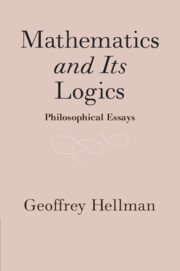Book contents
- Mathematics and Its Logics
- Mathematics and Its Logics
- Copyright page
- Contents
- Acknowledgements
- Introduction
- Part I Structuralism, Extendability, and Nominalism
- 1 Structuralism without Structures
- 2 What Is Categorical Structuralism?
- 3 On the Significance of the Burali-Forti Paradox
- 4 Extending the Iterative Conception of Set: A Height-Potentialist Perspective
- 5 On Nominalism
- 6 Maoist Mathematics?
- Part II Predicative Mathematics and Beyond
- Part III Logics of Mathematics
- Index
- References
1 - Structuralism without Structures
from Part I - Structuralism, Extendability, and Nominalism
Published online by Cambridge University Press: 26 January 2021
- Mathematics and Its Logics
- Mathematics and Its Logics
- Copyright page
- Contents
- Acknowledgements
- Introduction
- Part I Structuralism, Extendability, and Nominalism
- 1 Structuralism without Structures
- 2 What Is Categorical Structuralism?
- 3 On the Significance of the Burali-Forti Paradox
- 4 Extending the Iterative Conception of Set: A Height-Potentialist Perspective
- 5 On Nominalism
- 6 Maoist Mathematics?
- Part II Predicative Mathematics and Beyond
- Part III Logics of Mathematics
- Index
- References
Summary
As with many “isms,” “structuralism” is rooted in some intuitive views or theses which are capable of being explicated and developed in a variety of distinct and apparently conflicting ways. One such way, the modal-structuralist approach, was partially articulated in Hellman [1989] (hereinafter MWON). That account, however, was incomplete in certain important respects bearing on the overall structuralist enterprise. In particular, it was left open how to treat generally some of the most important structures or spaces in mathematics, for example, metric spaces, topological spaces, differentiable manifolds, and so forth. This may have left the impression that such structures would have to be conceived as embedded in models of set theory, whose modal-structural interpretation depends on a rather bold conjecture, for example, the logical possibility of full models of the second-order ZF axioms.
Information
- Type
- Chapter
- Information
- Mathematics and Its LogicsPhilosophical Essays, pp. 19 - 42Publisher: Cambridge University PressPrint publication year: 2021
